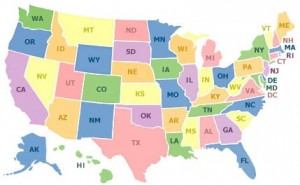 If you want a career as a school administrator, you might wonder if the school administrator certification is standard across all states. Certainly, some states participate in teacher credential reciprocity, but does that apply to superintendents and principals as well? When there is such a need for educators, won’t all states recognize certification to allow them to recruit administrators from other states?
If you want a career as a school administrator, you might wonder if the school administrator certification is standard across all states. Certainly, some states participate in teacher credential reciprocity, but does that apply to superintendents and principals as well? When there is such a need for educators, won’t all states recognize certification to allow them to recruit administrators from other states?
Common Standards
Most states base their school administrator certification on the number of credit hours a candidate has completed in an approved program. They also require an educator administration preparatory course, a valid teaching certificate and classroom experience, according to the National Council of State Legislators. That is how the reciprocity figures in to the administrator certificate; all administrators are teachers first, and their teaching credentials can transfer to other states. That is not to say they can trade off the certificate of one state for another because states often have additional requirements but, as pertaining to the commonly held standards, they will recognize the teacher certification of other states. Study.com says there are many commonalities in the educational programs required for certification. Most programs include courses in school facility management, school finance and in the legal issues that arise in school administration. Some states may require that applicants complete other courses, as well.
How Do States Vary?
States vary in requirements for certification through the number of years a license is valid. They also differ in the degree applicants must hold and in the number of years of experience an applicant must have before his certification is granted. There are also variances in the amount of professional development courses, or continuing education, administrators need to renew their licenses. Another way they vary is in accepting the administrator endorsements like “K-12” or “secondary.” All states require an applicant for credentials to pass an exam, but the content of the exams may be different.
There are “common core” requisites in all states. But they are administered differently. In Alabama there are two classes of certification: A and AA. The difference between them is whether a candidate has completed a fifth year of education beyond a Master’s degree. In Colorado and California applicants may hold a Bachelor’s degree in education to receive an initial license. Beyond that, Colorado requires three years teaching experience. California does too, but that is after the one-year internship their administrator preparatory program requires. Administrator certification candidates in Missouri must have Master’s degrees. Their preparatory program requires an internship as well, but applicants must have two years of experience beyond that.
Addressing Common Problems
States also differ in the way they address common problems, like certifying an applicant whose background is not in education. The most common degree besides education is a Master’s Degree in Management and Public Policy. States commonly require administrator candidates to have backgrounds in education, but some states are issuing a probationary license until the candidate completes a prescribed protocol of courses and experience. Forty-five states have already been using this procedure to recruit and train new teachers, but applying it to administrators is something new. There are also attempts at forming tiered licensing with stepped-up requisites between the tiers.
All states require certification or licensure to be a school administrator. They all require that applicants hold valid teacher’s certification, and all mandate an administrator preparatory program ending in a comprehensive exam. However, states differ in other details like the amount of experience needed to be certified and in the degree applicants must have earned prior to seeking the administrator credential. School administrator certification is not standardized across all states; for a complete listing of state requirements, visit Teaching Certification.com.